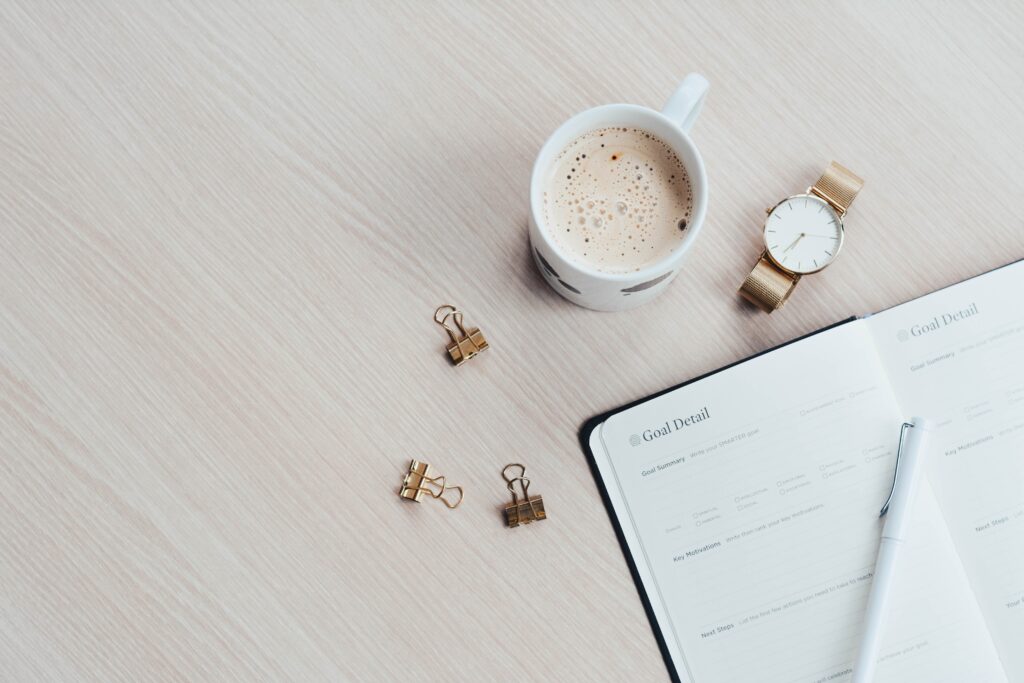
Habits: Sabotaging or Empowering?
5/15/2023
Habits: Sabotaging or Empowering? Problems can sometimes seem never ending. But when chaos becomes the norm rather than the exception, it’s definitely the time to stop and reframe your life with new, empowering habits. One of the challenges we all encounter when forming new habits is our inability to examine ourselves, to be present and […]
Habits: Sabotaging or Empowering?
Problems can sometimes seem never ending. But when chaos becomes the norm rather than the exception, it’s definitely the time to stop and reframe your life with new, empowering habits.
One of the challenges we all encounter when forming new habits is our inability to examine ourselves, to be present and aware of our feelings and sensations in a non-judgmental way.
The French philosopher Blaise Pascal once wrote, “All of humanity’s problems stem from man’s inability to sit quietly in a room alone.”
Psycologists have evaluated the fact that people in general have a tough time being alone or doing nothing. In one experiment, researchers allowed people to choose to receive a small electric shock instead of staying in a quiet room for 15 minutes. Half of the participants chose to leave early even if it meant taking the electric shock! (Wilson et al., 2014).

Meaningful Changes
To make significant and meaningful changes we need to be present, aware and intentional. We need to understand the why behind the change. In other words, we need to focus on the values that inspire our goals. Beyond that, we can choose something that adds value, joy, or meaning to our lives and the lives of others. An empowering habit is one that is not only intrinsically valuable, but also sustainable – one that naturally brings about momentum and motivation.
Habits are the first steps towards creating a system that facilitates our individual goals. As we learned on our last blog, we can find ways to break activation energy barriers and create new habits that bring about the change we wish to see in our lives.
Whether you wish to make more time for your loved one, find purpose, change your career path, or improve your overall well-being, understanding the fundamental value behind your goals will help you get started. Once you have your internal compass pointed towards your north star, you can form empowering habits and systems that keep you in that direction.
Change does not come easy. Creating a new habit is a challenging undertaking, but one that comes with immeasurable rewards.
Learning and regularly practicing a few steps or techniques will help you get started in forming lifelong habits:
- Identify the action you wish to turn into habit.
- Create a plan outlining the step-by-step process.
- Create a calendar to schedule specific actions.
- Track your progress.
- Be patient. Don’t allow setbacks to derail you.
- Start over if needed or tweak the plan as required.
Empowering Habits: Meditation
We at the BEE ME Project are your partners in change, your catalysts, and your support system as you move towards a happier, flourishing life. Here, we have listed some examples of empowering habits you might want to incorporate into your daily life, such as;
- Mindfulness Meditation. This habit focuses on awareness, presence and intention. This means training your mind to focus more on the present moment instead of wandering or worrying about the past or the future.
Regular meditation can help you form a healthier perspective because you are not trying to turn off your thoughts, feelings or sensations but instead observe them without judgment.
There are many forms of meditation but you can start by simply paying attention to your breathing or doing a body scan focusing on each part of your body from your toes to your head. Any activity or action that requires your full attention can be considered a form of meditation.

Empowering Habits: Gratitude
Creating a meditation habit is particularly useful as it can serve as a starting point for forming many other empowering habits, such as
- Gratitude. Feeling and expressing gratitude is a powerful habit that not only promotes well-being but connects us with the world around us. You can take a moment every day before you start your usual activities to examine and acknowledge everything you are grateful for and genuinely appreciate – even things that may seem trivial. This practice will improve your mood, brighten your overall outlook, help you face difficulties and facilitate your interactions with others.
Practicing gratitude will grow your ability to appreciate small things like a beautiful sunrise or sunset, an unexpected rainbow, receiving a kind gesture from a stranger, finding less traffic on the road. The possibilities are endless. Living your life with gratitude will boost your health and improve your relationships. Gratitude could be as simple as waking up and acknowledging you get another day.
Empowering Habits: Healthy Lifestyle
- Nutrition and Fitness. Setting nutrition and fitness goals have obvious implications to overall health. Beyond that they can help you build momentum to start and sustain a variety of beneficial activities. Creating a habit of healthy eating or regular exercise can enhance your overall life experience as you will have more energy and will be able to enjoy longer periods of overall well-being. Using positive reinforcement and breaking down habits into manageable portions can help you succeed.
If you choose to start a habit of running every day, take the time to set achievable goals. Instead of deciding to run five miles to start, focus on running one mile. Take the time to notice your environment. You will soon realize that it does not take as much effort as you initially imagined and will want to increase your distance or pace.
Empowering Habits: Reading & Writing
- Reading and Journaling: Reading increases brain connectivity, enhances your vocabulary and comprehension, relieves stress, lowers blood pressure and heart rate, fights depression and prevents mental decline as we age.
You can develop or enhance your reading habits by following some simple steps:
1. Set a reading schedule
2. Surround yourself with interesting reading materials.
3. Make a list
4. Find a comfortable location
5. Minimize distraction.
6. Read to others/your kids
7. Track your progress.
In a similar way, journaling can relieve stress, improve immunity, enhance memory, boost moods and regulate your emotion. Something as simple as putting your thoughts, emotions and ideas on paper can help you gain great perspective.

Empowering Habits: Community
- Connecting with kindred spirits: Studies have shown that healthy aging is connected to having meaningful and genuine relationships. Our need for connection is very human and natural. Developing and enhancing the habit of connecting with others will have positive implications for your health, your mood, and your general life perspective.
Connecting with others opens your mind and enhances your creativity. It also provides you with opportunities for personal development.
You can form a habit of making genuine connections by taking simple steps:
1. Making time for your important relationships
2. Being open and non-judgmental of others
3. Being honest about yourself
4. Sharing activities and ideas
5. Engaging in community activities and volunteering.
You will find that by making genuine human connections you will experience a mental boost and you will find life more fulfilling and meaningful.
Self-Sabotaging Habits
We all have behavioral patterns that prevent us from living our best lives. The root causes of this behavior are complex and multifaceted.
In some instances, these habits bring some sort of instant gratification.
We procrastinate because we want to avoid a situation or task.
We seek perfection because we know is unattainable, which provides a built-in excuse for failure.
We get defensive in the face of criticism to protect our ego rather than learning from failure.
In other cases, they are the symptoms of unresolved feelings and emotions.
Thinking back at the study we mentioned at the beginning of this blog, why are people so uncomfortable sitting alone with their thoughts that they would rather take an electric shock?
Many of us have difficulty dealing with negative thoughts and emotions that lurk in the back of our minds. As such, we seek to distract ourselves with external activities. The more we repress our internal thoughts, the more we compulsively seek external stimulation to occupy our attention.
This kind of self-rejection tends to lead to self-destructive behaviors and habits, including engaging in dangerous activities and developing addictions.
Although eliminating negative habits can be harder than creating new positive ones, let us invest some time and effort in eliminating or reducing some of our self-sabotaging habits by embracing awareness, intention, acceptance and trust.
Let us explore some of the most common self-sabotaging habits:
- Procrastination. When we procrastinate, we are avoiding something. It can be due to lack of motivation or energy, rebellion, fear and anxiety, among other causes. Paradoxically, by procrastinating we are actually increasing the likelihood of higher stress and anxiety and further avoidance. While the root causes are complex, we can take steps to break or reduce this habit.
- Negative Self-Talk. We all experience negative inner dialogue from time to time. We can be harsh, judgmental, and unkind to ourselves. These negative thoughts can lead to low self-esteem and lack of confidence. Past experiences and trauma can trigger this negative dialogue. Breaking free of this debilitating habit requires a conscious effort to examine our thought patterns.
- Perfectionism. Some of us believe that being perfect is a desirable goal and willingly engage in perfectionistic habits. Whether we seek perfection to gain approval or to feel in control, this habit can have many negative implications. Perfectionism can perpetuate self-criticism, fear of failure and frustration. Overcoming this habit requires a mindset shift, one that switches our attention to the present instead of focusing on unattainable or unachievable pursuits.
- Self-Isolation. Many people withdraw from social interactions due to fear, insecurity or lack of confidence. Past experiences and trauma can also cause us to seek solitude. This habit can lead to depression and sadness and it can be difficult to reverse without examining the root causes and reaching out for support and guidance.
- Negative Coping Mechanisms. These coping mechanisms include a variety of negative habits we engage in to cope with stress and difficult emotions. They range from overeating, gambling and overspending to substance abuse. These unhealthy behaviors can be exceedingly difficult to stop and may require professional help to deal with unresolved emotions and trauma.

Breaking Self-Sabotaging Habits
Breaking self-sabotaging habits requires a conscious commitment to change. Self-awareness, mindfulness, attention and intention are key. Identifying triggers and seeking support will go a long way in reversing some of your negative habits.
Here are some steps you can take to change your self-sabotaging habits:
- Identify your self-sabotaging habits: The first step is based on self-examination. Start by honestly identifying the habits that are preventing you from living your best life. Acknowledge the behaviors you wish to change.
- Develop self-awareness: Examine the reasons that fuel your negative behavior. When you become more aware of your motivation, you can recognize and change behavioral patterns.
- Set achievable goals: Create a plan of action that includes small, achievable steps. Evaluate what is meaningful and gives you purpose and decide what steps to take to achieve your goals.
- Practice mindfulness: Bringing your attention to the present moment with intention and acceptance can help you retrain your brain and shift your behavior. Use meditation and other mindfulness techniques to help you calm your mind and body.
- Journal your progress: Write down your experiences as you navigate the change process. Seeing your own words, thoughts and emotions on paper can function as a catalyst for additional change and growth.
- Create a support system: Seek the company of people who support your goals and encourage positive changes. Get involved in groups and activities that facilitate the process. Seek the help of professionals if needed.
- Celebrate your successes: Celebrate your achievements, even if you think they are small. Any change in the right direction is worth celebrating. Encourage yourself and share your success with important people in your life.
Overcoming self-sabotaging habits takes time and effort. Be patient and stay committed to your goals. Change is a process and with perseverance and dedication, you can replace self-sabotaging habits with empowering habits. Setting goals, practicing self-care, and cultivating awareness, presence and intention can help you break the cycle of self-sabotage and move towards a more meaningful, joyful and fulfilling life.
Learn how to do this and much more in our upcoming BEE ME Foundations course, a guided course in a supportive community helping you reclaim and reconnect to your holistic self.